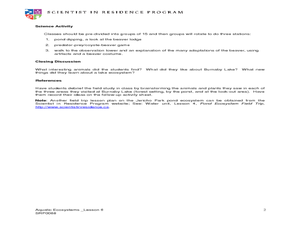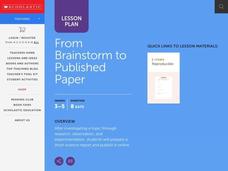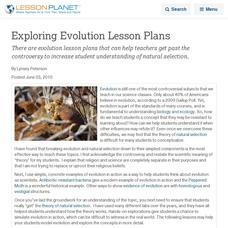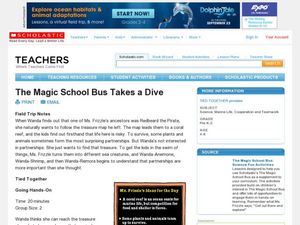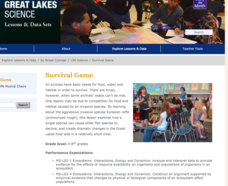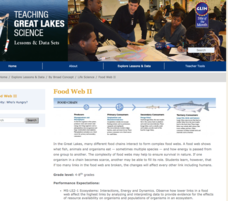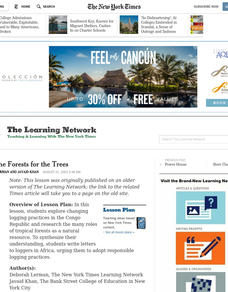Curated OER
Burnaby Lake Field Trip
Students identify different organisms found in the lake ecosystem. In this life science lesson, students discover the predator-prey relationship through a game. They explain how beavers adapt to the environment over time.
Curated OER
Good Heavens
Students look at the history of science to identify some of the scientific ideas that different cultures have contributed to science throughout history. They describe using examples ideas developed by different cultures to explain the...
Curated OER
Outdoor Art
Students create art projects outside. In these outdoor art lesson plans, students use items in nature to enhance their creativity. They are encouraged to paint rocks, use fences for collages, weave sticks/feathers through picket fences,...
Curated OER
From Brainstorm to Published Paper
Students investigate a topic through research, observation, and experimentation. They prepare a short science report and publish it online. Students reflect on the role of science reports in the larger scientific community.
Curated OER
Taking an Animal Census Grades 3-8
Students comprehend the competitive, interdependent, cyclic nature of living things in an environment. They conduct an animal census in a designated research area over a six-month period to determine what types of species are present,...
Curated OER
Exploring Evolution Lesson Plans
There are evolution lesson plans that can help teachers get past the controversy to increase student understanding of natural selection.
Curated OER
The Magic School Bus Wet All Over
Students observe the water cycle and experiment with cleaning water. In this hands-on hydrology lesson plan based on a Magic School Bus book, students conduct two experiments to see the how water moves through the water cycle and then...
Michigan Sea Grant
Wetlands
Wetlands may not sound particularly ornate, but they are as important as any habitat! With a hands-on activity, young scientists build a wetland model and observe its many functions in action. They discover the importance of wetlands to...
Curated OER
Ecology and Evolution
Students identify the different taxonomic classifications of organisms. In this biology lesson, students create their own organisms and make some changes according to environmental conditions. They present their work in class.
Curated OER
The Magic School Bus Takes a Dive
Learners learn along with Ms. Frizzle's class. In this Magic School Bus lesson plan, students find out how partners can help run a race just as Wanda learns that survival on the coral reef often depends on cooperation.
Curated OER
Feature Column: Virtual Field Trips
Young scholars discover ways to stay healthy by utilizing Internet education software. In this computer technology lesson, students investigate Internet programs that simulate a field trip by showing images and video. Young scholars...
Michigan Sea Grant
Invasive Species
Learners identify invasive species to the Great Lakes and analyze their impact on the ecosystem. Using photo cards with pictures and facts, young scientists work in small groups to match invasive species with their corresponding...
Michigan Sea Grant
Survival Game
Musical chairs may be a classic game, but Ruffe Musical Chairs is a unique lesson on invasive species! Using the time-honored game, pupils role play the behaviors of the invasive fish called Eurasian ruffe. Learning about this aggressive...
Michigan Sea Grant
Sea Lamprey
Learners discuss the types of technology that are used to control the population of sea lamprey in the Great Lakes. They explain the parasite/host relationship and understand the devastating impact invasive species have on ecosystems....
Michigan Sea Grant
Food Web II
A food web consists of complex food chains and the more complex the web, the better likelihood of survival. Learners compare and contrast food webs and food chains and discuss concepts like the predator-prey and consumer-producer...
Michigan Sea Grant
Fish Identification
Using a dichotomous key, pupils identify characteristics of fish who live in the Great Lakes and explain how these features help them survive. In small groups, class members discover what features scientists consider important and...
Curated OER
"Garden Springs Gardeners"
First graders ponder the question of how plants help their lives. They observe and compare properties of several different plants. Differentiate between living organisms and nonliving objects.
Curated OER
Small Pond Creatures
Students complete a unit about the different creatures that can live in a small pond habitat. They create a glossary, create a class Small Pond mural, develop a Frog Fact File, read a variety of books, and conduct research for a report...
Curated OER
Why Don't Whales Have Legs?
Students are given a variety of materials and are asked to design a heat loss experiment that results in a reasonable explanation of "Why don't whales have legs?" students work with the theory of natural selection.
Curated OER
Seeing the Forests for the Trees
Students explore changing logging practices in the Congo Republic and research the many roles of tropical forests as a natural resource. To synthesize their understanding, students write letters to loggers in Africa, urging them to adopt...
Curated OER
Chromosome Fusion
Students see how patterns can reveal events of the past, thereby merging elements of both experimental and historical science.
Curated OER
Destructive Decay
Students determine the destructive nature of plaque acid in their mouths. They use the scientific method for proving a hypothesis.
Curated OER
Blood Brothers
Learners study the blood characteristics of a number of distinct racial/ethnic groups. They build skills in observation, information gathering and processing. Students experiences strongly reflect the nature and intent of the current...
Curated OER
Merry Maple Leaf
In this Autumn activity worksheets, students go on a nature walk and find the colors of fall. Students then use paint to color the leafs in the fall colors they saw on the walk. Students then finish a poem about the fall leaves.


